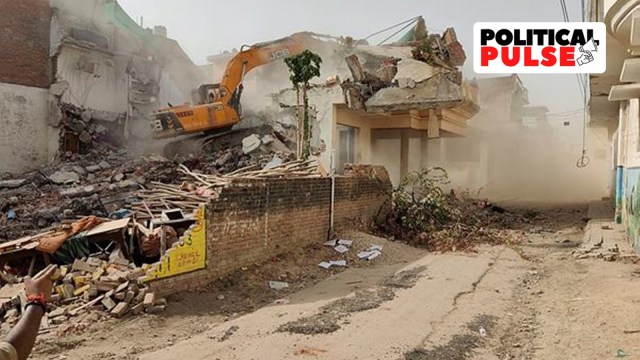Vikas Pathak is deputy associate editor with The Indian Express and writes on national politics. He has over 17 years of experience, and has worked earlier with The Hindustan Times and The Hindu, among other publications. He has covered the national BJP, some key central ministries and Parliament for years, and has covered the 2009 and 2019 Lok Sabha polls and many state assembly polls. He has interviewed many Union ministers and Chief Ministers. Vikas has taught as a full-time faculty member at Asian College of Journalism, Chennai; Symbiosis International University, Pune; Jio Institute, Navi Mumbai; and as a guest professor at Indian Institute of Mass Communication, New Delhi. Vikas has authored a book, Contesting Nationalisms: Hinduism, Secularism and Untouchability in Colonial Punjab (Primus, 2018), which has been widely reviewed by top academic journals and leading newspapers. He did his PhD, M Phil and MA from JNU, New Delhi, was Student of the Year (2005-06) at ACJ and gold medalist from University Rajasthan College in Jaipur in graduation. He has been invited to top academic institutions like JNU, St Stephen’s College, Delhi, and IIT Delhi as a guest speaker/panellist. ... Read More
‘Bulldozer justice’: As SC talks tough, a look at how it became the go-to for some state governments
The use of bulldozers to raze structures owned by accused was brought into vogue by UP CM Yogi and has since been adopted by BJP govts and also some run by Congress
 The BJP returned to power in Uttar Pradesh and, true to Adityanath's word, bulldozers were back in action within a week when houses of some rape accused were demolished to “put pressure on them to surrender”. (Express File Photo)
The BJP returned to power in Uttar Pradesh and, true to Adityanath's word, bulldozers were back in action within a week when houses of some rape accused were demolished to “put pressure on them to surrender”. (Express File Photo) Hearing a plea against “bulldozer justice” Monday, the Supreme Court proposed to lay down guidelines on the issue. “Can anybody’s house be demolished only because he is an accused. Even if he is a convict, still it (demolition) can’t be done without following the procedure as prescribed by law. We propose to lay down certain guidelines on a pan-India basis so that the concern with regard to the issues raised is taken care of,” the apex court said.
“Bulldozer justice” helped Uttar Pradesh Chief Minister Yogi Adityanath build a political brand, and an image of a tough-on-crime CM, especially in a state where rule of law was seen as slack.
Given the popularity of Adityanath’s measures, other BJP governments and even Opposition-ruled ones in a few states similarly dished out instant “justice”.
The authorities that conducted the demolitions, however, maintained that the structures they demolished were illegal.
Adityanath as ‘bulldozer baba’
During his first term, Adityanath registered cases against around 15,000 people under the Uttar Pradesh Gangsters and Anti-Social Activities (Prevention) Act and also demolished “illegally constructed” houses of several accused. It was the Adityanath government’s way of putting distance between its regime and the alleged “lawlessness” under the Samajwadi Party in the state, notwithstanding the voices questioning the propriety of the actions.
At an election rally in Mainpuri in February 2022, Adityanath proclaimed that “those getting aggressive would be silenced by bulldozers after the elections”.
The BJP returned to power in Uttar Pradesh and bulldozers were indeed out within a week when houses of some rape accused were demolished to “put pressure on them to surrender”.
In June this year, six properties owned by people named in two separate FIRs in Moradabad and Bareilly districts were demolished. While the first case was in connection with a shootout in Bareilly on June 22, the second was related to an alleged bid to kidnap a married woman from her maternal house in Moradabad on June 26.
Template for BJP governments
“Bulldozer justice” soon became a template of sorts, with other BJP state governments taking to it, and Prime Minister Narendra Modi also seemingly endorsing it during the recent Lok Sabha polls.
Modi said during a public rally in Barabanki on May 17, “SP aur Congress waale agar satta mein aaye to Ram Lalla ko phir se tent mein bhejenge aur mandir par bulldozer chalwaa denge. Kya Yogi ji se yahi seekhna hai? Are zara Yogi ji se tuition lo bulldozer kahaan chalaana hai kahaan nahin chalaana (If the SP and Congress come to power, they will send Ram Lalla back to the tent and use a bulldozer on the temple. Is this what they want to learn from Yogi ji? They should learn from him where to use the bulldozer and where not).”
One of the CMs who emulated UP’s ways was Madhya Pradesh’s Shivraj Singh Chouhan. Shedding his moderate image in the face of a tough election, he supported the use of bulldozers in April 2022, in the aftermath of the communal clashes in Khargone. His government demolished 16 houses and 29 structures.
Soon Chauhan came to be referred to as “bulldozer mama”.
In one of his first moves after taking the MP CM’s chair on December 14 last year, Mohan Yadav ordered the demolition of 10 meat shops in Bhopal as part of his “intensive campaign” to check “illegal purchase and sale of meat”. On the same day, the government razed the houses of three men who were accused of attacking a BJP worker.
On August 22, 2024, authorities in Chhattarpur demolished the house of local leader Shahzad Ali, a day after a group of Muslims were accused of pelting stones at a police station in the area while protesting against the alleged communal remarks of a Hindu religious leader. Incidentally, following the action, Yadav said he was not in favour of “bulldozer culture” and called for “more consideration regarding this part of our system”.
Earlier this year, the BJP government in Assam led by Himanta Biswa Sarma paid a compensation of Rs 30 lakh to five families whose homes the authorities had razed two years ago over their alleged involvement in torching a police station in Nagaon district.
The Sarma government also sanctioned compensation of Rs 2.5 lakh for the family of one Safikul Islam — whose death in police custody had led to the arson at the Batadrava police station by local residents.
Haryana too has witnessed “bulldozer justice”. The then Manohar Lal Khattar government, following the communal riots that erupted during a VHP yatra in Nuh in July last year which led to the death of six people and triggered an exodus, demolished several homes and other structures, believed to be of the accused.
In Delhi, days after communal violence broke out on April 16, 2022, in Jahangirpuri during a Hanuman Jayanti rally, the then BJP-led North Delhi Municipal Corporation demolished several structures, including the front gate and a wall of a mosque.
In Rajasthan’s Udaipur, the Bhajan Lal Sharma-led BJP government recently demolished the rented house of a schoolboy accused of stabbing his classmate.
Non-BJP state governments
Congress leader Ashok Gehlot, who as CM had slammed the bulldozer actions in UP and Madhya Pradesh and emphasised that no action could be taken against an accused till proven guilty, also resorted to “bulldozer justice” ahead of the Assembly elections. In January last year, the Jaipur Development Authority demolished a coaching institute run by people who were accused of leaking the question paper of the teacher recruitment exam.
In 2020, under the Maha Vikas Aghadi (MVA) government, with Uddhav Thackeray as the CM, the Brihanmumbai Municipal Corporation (BMC) demolished a part of actor-turned-politician Kangana Ranaut’s bungalow in Pali Hill in the wake of her controversial remarks comparing the city with Pakistan-occupied Kashmir (PoK), an action that the Bombay High Court called mala fide.







- 01
- 02
- 03
- 04
- 05

























